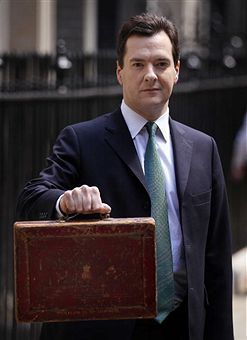 George Osborne is an enigma. For many, his politics and personality are defined by a
photograph of him sneering in the Bullingdon’s clashing colours. The determined face that presented the Budget contradicted that stereotype; it suggested that Osborne was coming of age.
George Osborne is an enigma. For many, his politics and personality are defined by a
photograph of him sneering in the Bullingdon’s clashing colours. The determined face that presented the Budget contradicted that stereotype; it suggested that Osborne was coming of age.
Paul Goodman was part of Osborne’s Shadow Treasury team and one of the ‘Gang of Four’ who prepared IDS and Michael Howard for PMQs, along with Boris, Cameron and Osborne. He has written an extensive appraisal of Osborne the man and politician. Read the piece: it’s enthralling, a detailed account of Osborne’s political adolescence through the years of defeat and a candid analysis of his tactical expertise.
Two of Goodman’s observations stand out. Osborne’s wants to win. All policy is dictated by that consideration and Osborne takes risks in its pursuit. Goodman writes:
‘Of the four Shadow Cabinet members I served under (David Willetts, Eric Pickles and Caroline Spelman were the other three) he ran the most focused meetings. If the conversation drifted to process rather politics, he’d close it down rapidly. I may be wrong, but I thought that he’d a tendency to do this with Philip Hammond, who succeeded Theresa Villiers as Shadow Chief Secretary. One of core convictions of early modernisation was: stick with it, whatever the pressure. Make your own Clause Four moment. Find a way of taking on your own Party. It says a lot about Osborne that when, in the autumn of 2007, this view clearly wasn’t delivering, he broke with it, leaving behind him a new name for those that wouldn’t – the über-modernisers. He tore up the script, announced inheritance tax and stamp duty cuts to the Conservative Conference, won huge cheers, dramatically reversed the Party’s poll ratings, and frightened Brown off calling an election. He pulled off much the same trick with national insurance in the election.’
Second, Osborne’s Conservatism differs from Cameron’s. He is an urban Tory, a social and economic liberal. Goodman lists Osborne’s voting record on social issues and no wonder Osborne is cool about Cameron’s marriage proposals:
‘On the basis of what I’ve seen and what he’s said, I suspect that Osborne gravitated towards centre-right politics because, well, that’s kind of where his upbringing pointed to – his parents, remember, are business people (his father being one half of Osborne and Little, the wallpaper designers) – and where the centre of gravity of his social circle was. My best guess is that he’s come round to believing economic liberalism – in the small state – because it marries up with his social liberalism, which runs deep…In 2002, he voted with the whip against gay adoption. As a new MP, he wouldn’t have wanted to antagonise the powers-that-be or undermine the position of Duncan Smith. But in the main vote a year later on Section 28 – which banned the promotion of homosexuality in schools – he went through the lobbies to scrap it. From then on, he supported the liberal ticket down the line – on civil partnerships, on the Equality Act regulations (which, for example, made it illegal for Christian bed and breakfast owners to turn away gay couples), on fertility treatment requiring both a father and a mother, on lowering the abortion limit.’
Goodman concludes by asking if Osborne’s Budget – a huge political risk that stakes all on victory at the next election – was out of character. On the basis of Goodman’s sketch, it was not, emphatically so.






Comments